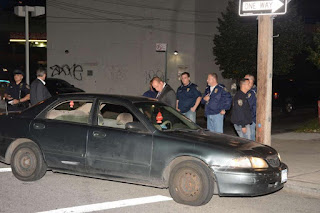Kibera is the largest slum in Nairobi, Kenya. Authorities estimated the population of the ‘Forest’ to be 500,000 to a million residents, who live on less than $1 a day. Crime and disease ravage the vast shantytown lacking schools, electricity, running water, and medical care.
On my second day in Africa the Red Hook contingent; Natalia, Larry, and Laikyn, accompanied five Kibera natives to Soweto. Our guide Fast Steve warned we had to be careful. He helped run the local boxing club.
“Kiberans are good fighters. Hard hands and harder heads.”
“People don’t like photos. They think you’re taking them to think you are better than that. Bring no money and only your phone.”
“I’ve been to ghettos before.”
The Lower East Side.
Bangkok’s Klong Toey.
Paris’ Bidonville.
Larry and Laikyn hailed from Red Hook, Brooklyn’s notorious crack capital. Back in the day bullets flew between gangs night and day. Some hit some of their intended targets. More often they struck ‘mushrooms’ or innocent citizens far from the action.
The NYPD treated everyone like a criminal. It was part of the 76th Precinct’s training for the ‘slave patrol’ mentality.
None of these ghettoes rivaled Kibera.
‘The Forest’ had revolted after the last election and while the poor hated the rich, even more they despised politicians who stole everything, even the future.
Kibera was peaceful on this Saturday. The main street was crowded with thugs, families, young men and women, most with a smile on their faces despite the constant threat of economic chaos.
The New Yorkers were used to this. Red Hook had suffered the hell of Crack in the 80s. Gunfire echoed from the front to the back of the low buildings. The twenty year-old were cousins.
I was simply an old white man, but I wasn’t scared, because I came from the South Shore of Boston. Jackman called me M’zee. He saw something in me. M’zee was better than being a ‘mzungu’.
Young boys played football on a dusty soccer pitch.
Below the bluff reeds stretched across a valley and Fast Steve explained, “Once water filled a basin at the edge of Kibera. They had a yacht club, but the lake is gone.”
“So I see.”
“The streams are filled with plastic. The water is gone. Maybe one day it will come back.
“I hope so.” I doubted any recovery from plastic, but Fast Steve was young. He pointed to the left.
My eight charges posed for a shot.
I tried to remember everyone’s names.
I failed with the girls. They were shy. Their eyes held stories. All our eyes did the same. Young and old.
We walked by the football field and Steve explained, “This was a rough field controlled by the gangs, but we found money to level it. My team is Arsenal.”
Everyone all around the world loves the English Premiership.
And boxing.
The old boxing club was in rough shape.
The young fighters had hope.
“Kibera is all about solutions,” said Steve. He had saved people from the terrorist attacks in Nairobi and I wondered I could beat him in a foot race. He didn’t look that fast.
After all life is all about hope and none of that more than for Vanessa’s sister, Hope.
We were led to the women’s center on the main road.
An eight year-old girl recited poems about being a proud slum girl, cancer, and corruption.
“I am a slum girl.”
Her mother had written the words. Hope recited them without fear. The poem was written for women everywhere.
Her poverty remained poverty around her. Kiberans live on less than $1 a day and the hope became Hope, for life is all about one person changing everything for everyone else and everyone believing that change can transform the world. My good friend Tim Challen knows this. He is a true believer in hope.
Jubah also comes from ‘The Forest’. He had many friends and also had a story, although not for today and says, “Despair is only for those who will not fight for themselves in this world, because we live together in the present and the afterworld was only for our ghosts.
Jackman was equally optimistic, “We believe in solutions, because fighting gets us nowhere.”
Coming from young people it almost sounds true.
On the way back from Kibera I spotted the train stockyards from an overpass. The engines’ paint had been replaced by rust. I loved decay and shouted, “Stop. I want to see the trains.”
“We can’t do that. It’s too dangerous.”
The driver obeyed Steve.
“More dangerous than Kibera.”
“Much more dangerous, especially if we go as a group. When we come back from Kilimanjaro, I will take you there. Alone.” He didn’t want to endanger the team.
I was just an old m’zoongoo.
“Okay.” I had seen our schedule.
Tomorrow we left for the slopes of Africa’s tallest mountain and I glanced over my shoulder. The trains weren’t going anywhere, but I was going farther down the line.
To Kilimanjaro.
The tallest peak in Africa.


























